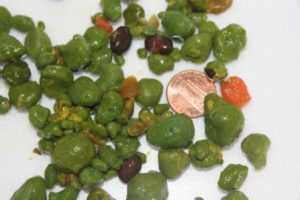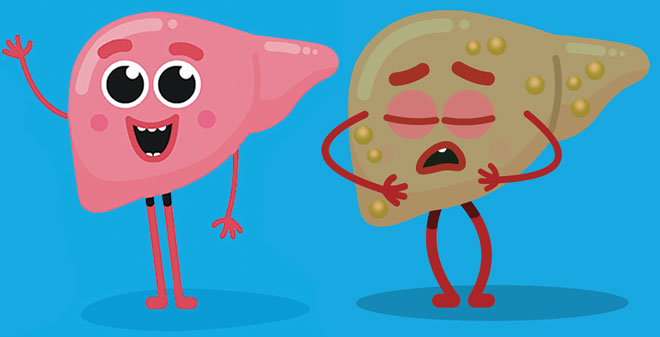14 Tips for Restoring Liver Health
 After years of battling liver impairment, I realized the problem was more complicated than I thought. I had taken herbs/supplements, completed fasts, performed cleanses, but nothing REALLY helped. Finally, I met a doctor who opened my eyes. Rather than taking supplements to stimulate liver function, I needed to remove the things that were putting stress on the liver. In short, the more stress we removed from the liver, the easier it would be for it to heal.
After years of battling liver impairment, I realized the problem was more complicated than I thought. I had taken herbs/supplements, completed fasts, performed cleanses, but nothing REALLY helped. Finally, I met a doctor who opened my eyes. Rather than taking supplements to stimulate liver function, I needed to remove the things that were putting stress on the liver. In short, the more stress we removed from the liver, the easier it would be for it to heal.
Since it was EXTREMELY tough to get out of this “toxic trap”, I wanted to help others escape as well. For this reason, I created a DETAILED list of the steps I used to restore liver health.
14 Tips for Restoring Liver Health
Eliminate Food Sensitivities
Food sensitivities are FAR more common than people realize. In fact, up to 20% of the general population is now reporting skin allergy, asthma, intestinal symptoms, headaches, and behavioral changes related to foods.(1) In addition, in the last 9 years, food allergy cases have increased almost 400%. (2) None the less, when a food reaction occurs, it creates inflammation in the gut (3) depending on the severity of the allergy.
If the inflammation is chronic, it can lead to a leaky gut, a condition which allows larger molecules to enter the blood. Eventually a chain reaction occurs which results in liver inflammation. This process is further exacerbated due to the the portal vein’s access to the liver. This portal vein allows undesirable content in the gut to be deposited directly into the liver, furthering oxidative stress.
To determine your food sensitivities, remove all potential allergens via the elimination diet protocol. After 21 days, then reintroduce one food every 3 days. When you start eating each of these foods again, you will notice if you feel different or not. This symptoms of food sensitivities are: increased pace of thoughts, hyperactivity, post-meal crash, food cravings, redness of skin, dryness and/or itchiness of skin, mood swings, exhaustion, muscle weakness, stuffy nose, puffy face, bloated gut, rashes, depression, anxiety, desire to keep eating more, etc. Honestly, it all depends on the person. I have experienced EVERY ONE of those reactions from food sensitivities.
If you do not possess the self control needed for the elimination diet, you can always complete a blood test for food sensitivities. In my experience though, it is actually less effective at determining potential irritants. The reason being, you could be sensitive to a food but it not appear on a blood test. You then go on eating that food daily and wonder why you still experience symptoms. None the less, the blood test is still the second best option.
Reduce Processed Foods
Processed foods have their fiber, nutrients and health benefits stripped from them. In addition, they contain long lists of synthetic ingredients and chemical additives which add toxic burden on the liver. If that wasn’t enough, processed foods have been shown to create inflammation in the gut, and help feed pathogenic bacteria. Both of these eventually lead to leaky gut. This then creates a chain of events that results in liver inflammation. I know it tastes good, but trust me, it’s not worth it!
Increase Plant Fiber
Plant based fiber absorbs toxins in the gut and helps push waste through. This helps reduce the amount of toxins circulating in the blood. By reducing toxins in the blood, the liver has less work to do.
In addition to reducing toxic burden in the body, plant based fibers also feed good bacteria (4). These bacteria are responsible for breaking down nutrients which are needed by the liver. They are also responsible for maintaining the integrity of the gut barrier. This makes sure toxins don’t leak from the GI system back into the liver via the portal vein. In summary, the more plants you eat, the better.
Modify Protein Intake
Eating too much meat puts unneeded stress on your liver (5). Why? Because animal based proteins are hard on the liver due to their protein density. In addition, they require far more enzymes/acids to break down. Though the liver does need amino acids to function properly, ideally, you want to get them with the least amount of digestive effort. For this reason, I eat meat sparingly, and replace it with beans, kefir, colostrum, and whey protein isolate if needed.
The main point to remember is, you DO need protein, but you want to get it from the simplest sources possible. A good rule of thumb is, plant based protein sources are typically easier to digest than animal based proteins. In addition, if you’re eating meat, the smaller the animal, the easier it is to digest. For example, turkey is far easier to digest than beef. In summary, making a few small changes to your protein intake could have a BIG impact on liver function.
Balance Gut Bacteria
If you have an overgrowth of bad bacteria in your gut, it adds stress on the liver (6). Unfortunately, these bad bacteria created byproducts which can lead to inflammation in the gut (7). If this inflammation becomes chronic, it can then cause leaky gut syndrome. As described prior, this then can lead to a chain of events that eventually results in liver inflammation (8). For more information on healing leaky gut, read my article, 10 steps to heal leaky gut.
To balance gut bacteria, the first step is determining if the symptoms are related to an infection, or simply a bacterial deficiency. If symptoms appear systemic or life-altering, there is typically an infection present. This could be bacterial, fungal, and/or parasitic in origin. To learn more about what supplements I used to overcome infection, read my article Secret Supplement List – Matt Sikora.
If your symptoms are less severe and localized, you may be experiencing a bacterial imbalance. In many cases, this can be due to poor diet or antibiotic use. In this instance, HIGH DOSES of bifidobacterium (9, 10), coupled with a significant increase in plant fiber will typically relieve symptoms.
Replace Trace Minerals
Trace mineral deficiencies can effect EVERY aspect of the body. First of all, if you have mineral deficiencies you are more likely to accumulate heavy metals AND they are more toxic to your body (11). In addition, trace minerals are required for enzymatic production in the body, which is critical for detoxification. In short, if you have plenty of minerals stored in the liver, it can respond well to threats. If you don’t, you are likely to recirculate toxins, which will eventually lead to disease.
Increase Glutathione
Glutathione levels are directly correlated with liver health. In one study, it was shown that glutathione supplementation reversed many signs of non-alcoholic fatty liver disease.(12) The main function of glutathione is to neutralize free radicals, which allows them to be eliminated from the body. This keeps toxic burden lower in the blood, which allows the liver to build up reserves. Based on studies, liposomal glutathione is the most effective way to increase GSH levels (13).
Eliminate Unhealthy Fats
Foods with saturated fats like butter, eggs, meat, cheese, etc, are the worst for your liver (14). Not all saturated fat is bad for you, but if it’s heated at a high temperature/pasteurized, it changes chemical structure (15). Ideally, you want to use plant based fats versus animal based. Also, be sure to look into “smoke point temperatures” for the oil you’re cooking with. This will make sure you don’t cook at too high of a temperature, which would damage the fat and change its health properties (15).
Juice Vegetables
Vegetable juices are an ideal way to get plenty of nutrition quickly. In addition, it’s a great way to reduce the number of meals you’re eating. By reducing the size and number of meals, you are gentler on the liver.
Make sure to start off with vegetables that are less green, and then work your way into darker green plants. This is VERY IMPORTANT because when you have a dramatic shift in alkalinity, it triggers a release of toxins from the cells. In short, you do not want to release more toxins from your cells than your liver can process. For this reason, you must ALWAYS take it slow when you first start juicing.
Intermittent Fasting
If you want what is best for your liver, consider intermittent fasting (16). Believe it or not, you lose over 50% of your body’s energy when you digest a meal. By ONLY eating within an 8-10 hour window, you give your liver a break for more than half of the day. This helps it remove built up toxins, allowing it to increase efficiency, and slowly escape from oxidative debt. Typical eating schedule for me is: trace minerals in the morning, colostrum/kefir/veggie juice for late breakfast, and then water til 1pm. Then I start a eating slow and steady from 1pm-9pm. This allows me to eat slowly for several hours straight, while also giving my liver plenty of time to repair.
Meal Replacements
The “heavier” the food, the more stress you’re putting on your liver. For this reason, I eat a MAX of one heavy meal per day. The rest of my meals are either snacks, small meals or liquid nutrition. Keep in mind, you want to “baby your liver” during this process. Ideally, you NEVER want to FEEL full, you just want to remain not hungry. This helps to keeps the liver focused on repair and detoxification, rather than digestion.
My favorite meal replacements are: raw colostrum, kefir, carrot juice, whey protein isolate, fruit smoothies, and broken cell wall chlorella. Anytime I replace a meal with one of these, I feel MUCH better that day, and even the following day.
Remember, 50% of your body’s energy is LOST when you’re digesting food. Keep in mind, when it is not digesting food, it’s performing repair functions in the body. For this reason, I try to implement meal replacements at least 1 time per day. Please note, if you are using meal replacements you MUST also consume plenty of PLANT FIBER. If you don’t, you could cause constipation which could add further stress on the liver.
Increase Circulation
By increasing circulation, you force more blood through the liver. This helps to naturally stimulate liver detoxification and further the breakdown of toxic chemicals in the body (17). If you are unable to exercise due to health issues, I STRONGLY recommend using the sauna. In my experience, it helped DRAMATICALLY with all of my symptoms associated with liver impairment. Keep in mind though, you must work your way up slowly with the sauna. Tolerance to extreme heat and toxin mobilization doesn’t just develop overnight.
Supplementation
Remember, the goal is NOT to support the liver, but rather, to reduce the amount of stress on it. By doing so, you will allow the liver to heal itself. For this reason, I only took a few supplements which all had one thing in common: they were known to reduce oxidative stress on the liver. These were apple pectin, chlorella, humic acid, and liposomal glutathione.
Apple pectin powder was essential when my diet was lower in plant fiber. It has extremely strong binding properties in the gut which reduces the circulation of toxins, and helps good bacteria grow (18, 19). This in turn reduces the amount of toxins the liver has to process. When purchasing apple pectin powder, MAKE SURE there are NO extra fillers. Most of the products out there are cut with dextrose or other additives which them not worth buying.
Broken cell wall chlorella is great for binding to metals, pesticides, and other toxins in the gut (20, 21). Not only does it decrease toxic burden which helps the liver, it also promotes alkalinity which makes the entire body operate better. This has to be one of my favorite supplements. I used it in higher doses of 10-15g per day when cleansing, but 2-3g daily maintenance doses otherwise.The key is finding a good supplier with organic broken cell wall chlorella in CAPSULE form. Trust me, you do NOT want to drink this stuff every day,
Humic acid contains many of the nutrients needed to support liver health, In addition, it has been shown to chelate metals, toxins, and even prevent liver injury (22, 23). This gives you the best of everything in one supplement. To learn more about it’s benefits, read my article The Real Story on Humic Acid. In my experience, this is the strongest detoxification product on the market.
Lastly, I used glutathione to help heal my liver. As mentioned prior, glutathione levels are directly related to liver health (24). Based on studies and my experience, liposomal Glutathione is the best product for increasing serum GSH levels. This helps the body escape oxidative debt, which reduces the burden placed on your liver.
Liver Flushes
The Original Liver Flush by Hulda Clark was CRITICAL to healing. Little do most people know, your gallbladder function has a lot to do with your liver health (25). If the gallbladder is impaired due to gallstones, it will force the liver to create more bile to make up for it. As we mentioned, the last thing we want to do is add more stress on the liver. For this reason, I feel the liver flush is ESSENTIAL for anyone who has chronic symptoms of liver impairment. Take a look at pic below. These are REAL gallstones extracted with the Hulda Clark Liver Flush.

Conclusion about Liver Health
As you can see, you must first heal the rest of the body before the liver can fully repair itself. The good thing about the liver is, it has an AMAZING capacity to heal. The bad thing is, if not functioning properly, it effects EVERY aspect of your life.
Though I did mention a few supplements, I want to remind you, diet/lifestyle are the most critical factors in liver health. Keep in mind, EVERYTHING you put into your body must be processed by the liver. The hardest foods to break down are meat, proteins and unhealthy fats. Do your best to limit those while increasing plant fiber as much as possible. I know it may sound like quite an adjustment, but trust me, your future self will thank you.
Matt Nedin
EndSickness.org
Phone: (734) 846-8619
Email: endsickness@gmail.com








